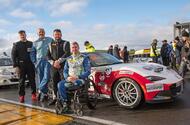
Jones, Frankel, Dwyer and their MX-5 racerAfter risking it all to protect other people’s lives, racing helped save theirs. This is when motorsport really matters
"There is not a doubt in my mind that racing saved my life.” As statements go it’s pretty bold, but when it comes from a US Marine who’s lost one leg above the knee and who bears all over his remaining limbs the scars of both his catastrophic injuries and more than 50 operations required to rebuild his shattered body, he can be believed. He is Liam Dwyer.
Today he is sharing a Mazda MX-5 Global Cup racer in the 12-hour Race of Remembrance, at a wind-torn, rain-soaked Anglesey circuit with two other military men, all sharing the unenviable distinction of being in the wrong part of Afghanistan at the wrong time and being blown up by improvised explosive devices.
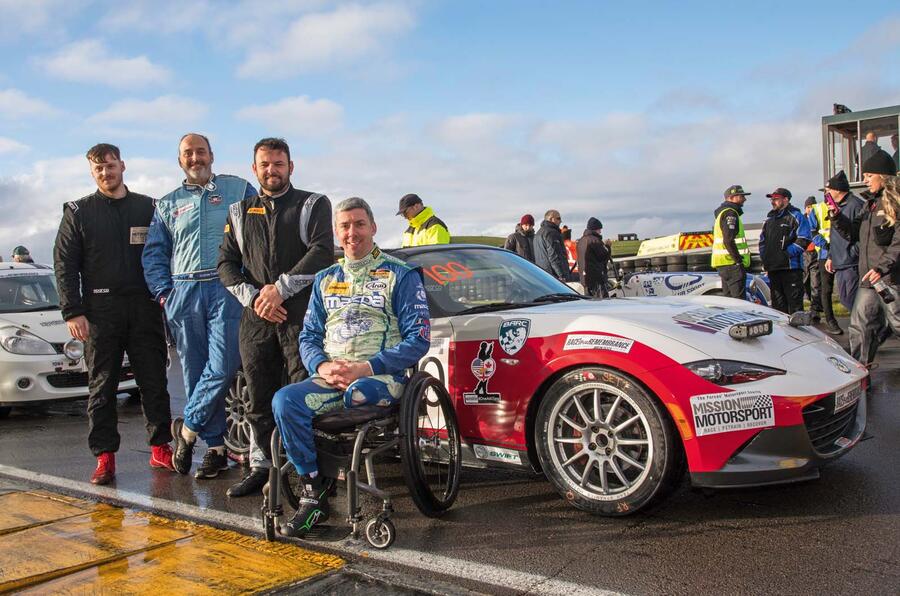
One is a British paratrooper called Andy Jones. Andy is built like one of the larger Alps. Because he was merely near the IED and because he was frankly bloody lucky, he kept his legs. The shrapnel passed right through him, so hot it conveniently cauterised the wounds on the way, missing every major blood vessel. But he still remembers looking at his thigh and noting there was now an exhaust manifold sticking out of it. “They pack ’em with anything they can find,” he says flatly.
And then there’s Paul Vice, Vicey to one and all. If you heard his story, you’d make a film out of it, except someone already did. He’d already won the Military Cross when he trod on the IED. His most immediate problem was not a leg so mangled it would later be removed, but a broken neck with a 90% severed carotid artery – a British record among survivors, he proudly assures me. He lived only because a fellow Marine thoughtfully stuck his knee into the wound. But he still had a stroke, resulting in brain damage, and lost part of his sight and hearing. His heart stopped twice on the Chinook flying hospital which ran out of blood trying to save his life. Once stabilised, more than 400 lumps of metal were pulled out of his body. He’s described as the most injured man to survive Afghanistan. If you fancy losing an hour on YouTube, I’d commend The Commando who Refused to Die.
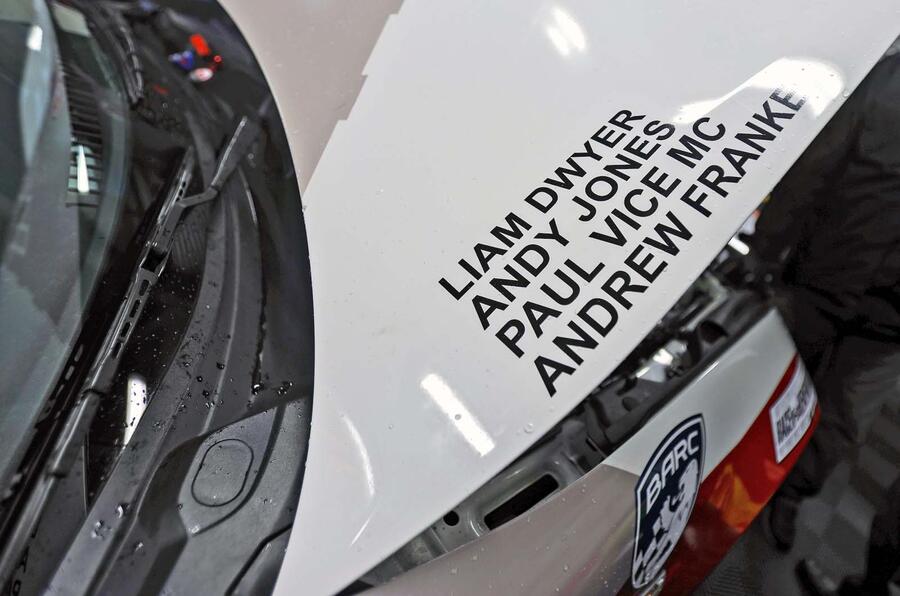
There was a fourth driver too. His name is Andrew Frankel and, given the company he was keeping, that’s enough about him.
The Race of Remembrance is an event like no other. Organised by Forces charity Mission Motorsport, it is part fundraiser, part opportunity to pursue its aim of helping injured veterans and their dependants ‘race, retrain and recover’. This year, we were racing for its Canadian/US counterpart Operation Motorsport (hence Liam), and dozens of beneficiaries from both organisations were dotted up and down the pit lane – some driving, many more working in the pits spannering cars, changing tyres and refuelling.
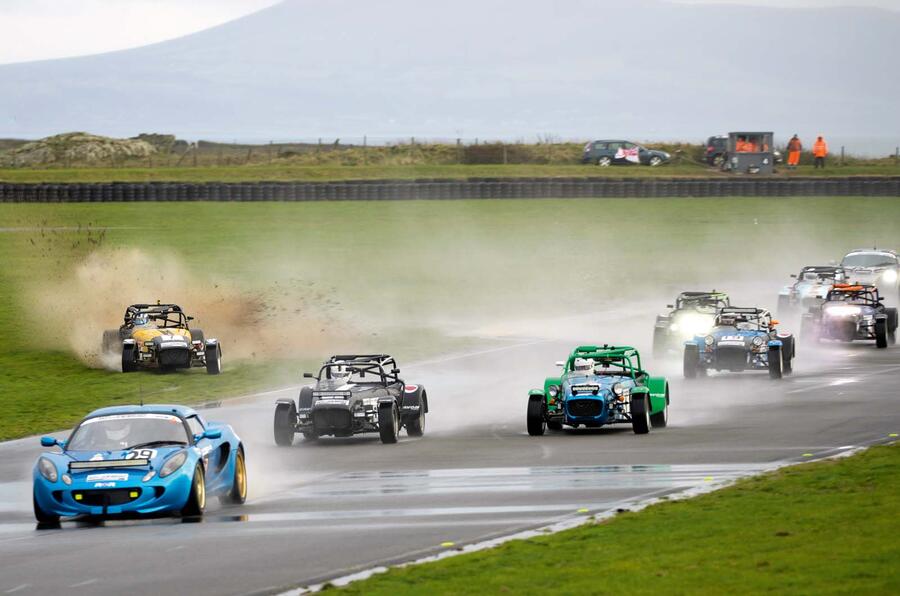
Mission Motorsport is only six years old but has provided more than 4000 training days for almost 1300 beneficiaries, leading to over 200 placements and more than 100 jobs. Run by veterans for veterans, it is an organisation fuelled by compassion, determination, love and, above all, banter. No one escapes and when it starts between Marines from either side of the Atlantic, stand clear. At the Heroes’ Dinner the night before the race, all four of us were on stage when Vicey rolled up the trousers of Liam’s rather battered remaining lower limb and said “call that a leg?” in front of the 450-strong crowd. To which Liam replied: “Great, coming from a man with a paper cut.”
The race itself goes into the night on Saturday, then restarts again on Sunday morning, stopping for an 11am remembrance service in the pit lane before ending that afternoon. Mission Motorsport boss Major Jim Cameron describes the whole weekend “as a remembrance service with a motor race built around it”, and he’s right. When we fell silent, 100 years to the minute after the end of World War I, well, it was just about the most moving thing I’ve done.
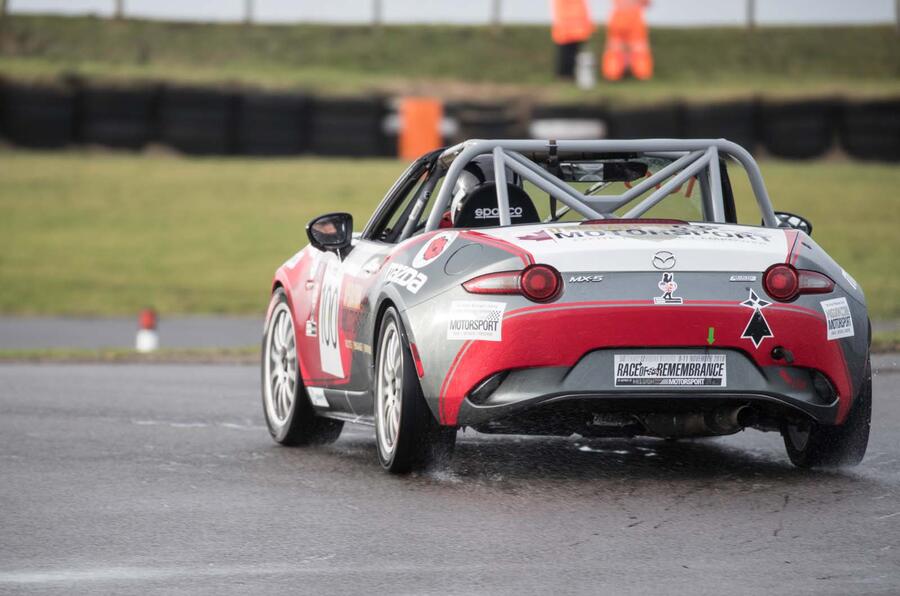
Really, we shouldn’t have been on the grid at all. Our car only arrived in the UK the day before qualifying, had to be fitted with a Sadev sequential gearbox overnight (clutch work is not easy for an above-knee amputee like Liam) and was then almost nicked off its trailer on its way to Anglesey. It had never turned a wheel in anger and therefore arrived with no set-up and on quasi-slick tyres that would doubtless work beautifully on a warm, dry track. Anglesey is rarely either in November.
We fiddled with roll bars, damper rates and tyre pressures through practice and qualifying and could see there was a superb race car in there somewhere, but on the wrong tyres in the wrong conditions the quicker we made it go, the more it wanted to throw us into the scenery. Our choice was fast and twitchy or slow and (relatively) stable. For a 12-hour race, the latter was the only viable option.
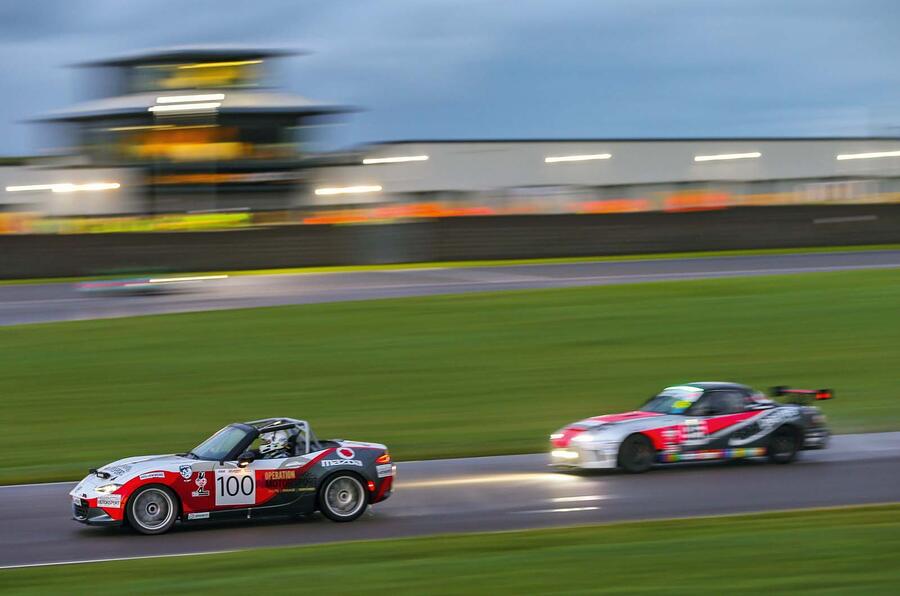
Vicey started because he’s rarely happier than when duking it out on the opening laps. These days, he races in the British GT Championship and is extremely useful at the wheel. Fairly unambiguous hand gestures every lap told us how he thought the car was handling in the appalling conditions but, just over an hour later, he handed over to me without drama. I then spent 90 minutes slithering around in the half light, dusk and finally dark, wishing we were on the right tyres. The MX-5 felt caged and, had we the means to let it loose, I expect it would have raised a lot of eyebrows. This is no street car with a roll-cage, but a properly developed racer.
Then Andy climbed in and had an equally uneventful time before handing over to Liam, who was halfway into his stint when the propshaft broke. We were already using our spare and as it is a unique prototype part due to its need to connect to the Sadev, that was it. We were out less than five hours into a 12-hour race. So we did what race drivers used to do in such circumstances and retired to the bar.
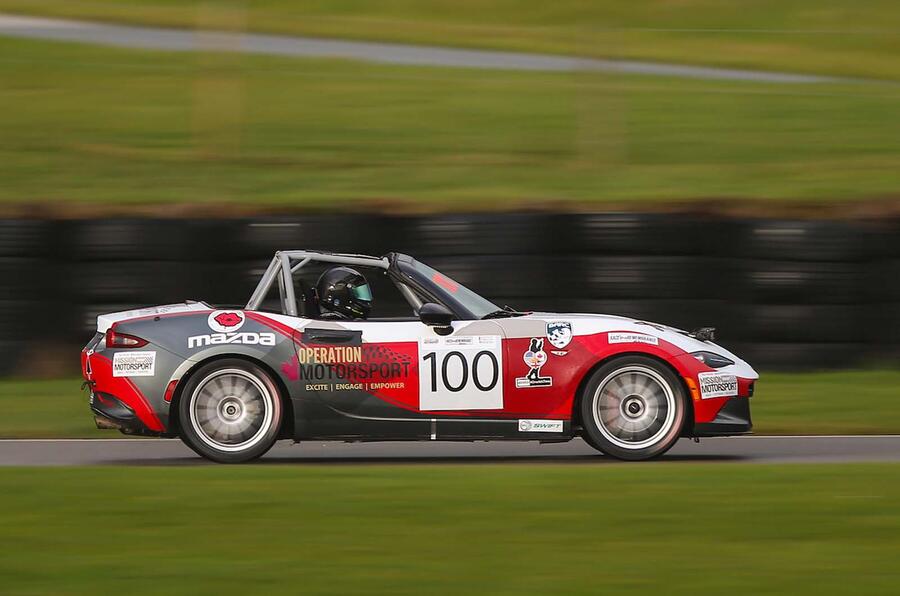
Liam was clearly pained the car had quit on his watch, so Andy and Vicey did what any caring team-mate would and ratcheted up the banter to ever higher levels. To most it would seem pretty heartless, kicking a man when he’s clearly down, but it’s nothing of the sort. It’s how these battle-hardened veterans actually support each other. It is their code, and it works. Soon Liam was once more giving as good as he got.
Nor were we quite done racing, after all. The next day, Mission Motorsport made sure we were all slotted into other cars; I ended up in an automatic, diesel Honda CR-V.
And as I was sliding around, getting in everyone’s way, it occurred to me that, although I’ve been racing for a quarter of a century, the Race of Remembrance is the only actually important race I have ever done or will ever do, and I hope I’d feel the same way if I was a Formula 1 driver. Like Liam said, racing saved his life and I know that, to one extent or another, the others feel the same way. From what I can see and for most of these veterans, the injuries you can see are as nothing compared with those you cannot.
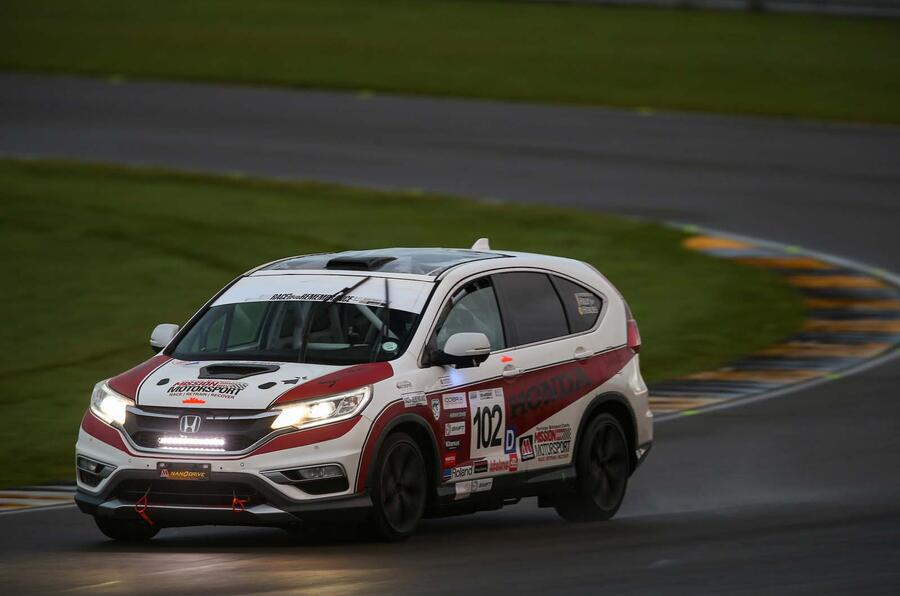
Put it this way, Andy went from being a member of one of the most elite regiments on earth to living rough, his entire life packed into six bin bags. Last year, he did the Race of Remembrance, his first ever race. He is now settled with a wonderful family and a new job using his unique qualifications to help civilians cope with their mental health problems. So I’ll leave the last words to him.
“Without the Race of Remembrance, I probably wouldn’t be here.” An important race? A life-saver, no less.
If you are interested in the work of Mission Motorsport, visit www.missionmotorsport.org
The Mazda MX-5 Global Cup car
MX-5s have been racing since they were launched nearly 30 years ago, and as an official series since 2003. The fourth-generation race car is designed to compete all over the world, hence ‘Global’. It is a 2.0-litre MX-5 with its interior and windows removed and fitted with all the necessary safety systems including a Nascar-standard roll-cage.
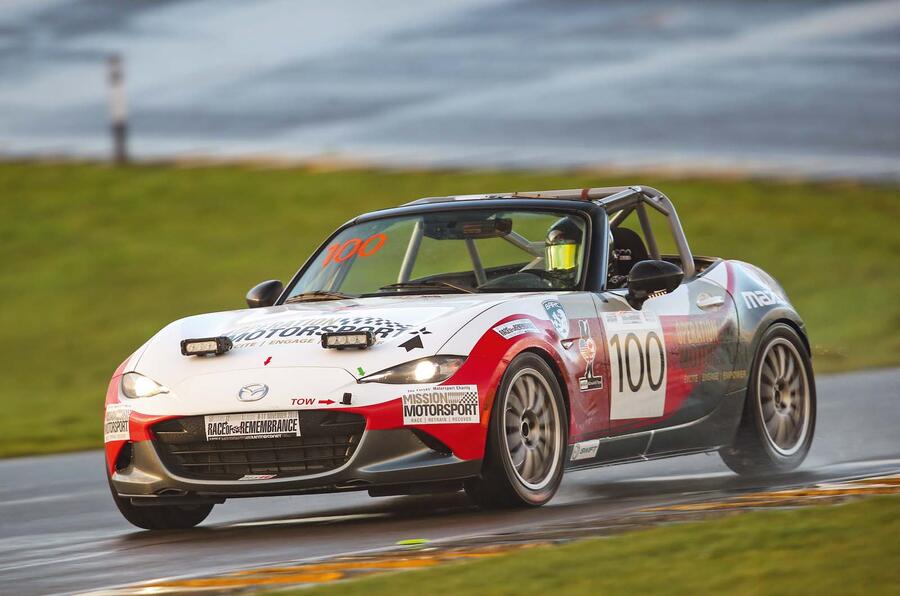
Its engine is showroom specification save a different ECU and exhaust, but the suspension and brakes are to full race spec. It felt so inherently quick that if we’d had a day’s testing and some appropriate tyres, it could have done shockingly well. Maybe next year…
Read more
The £2 million roadsign business run by veterans
via Autobuzz Today
Comments
Post a Comment